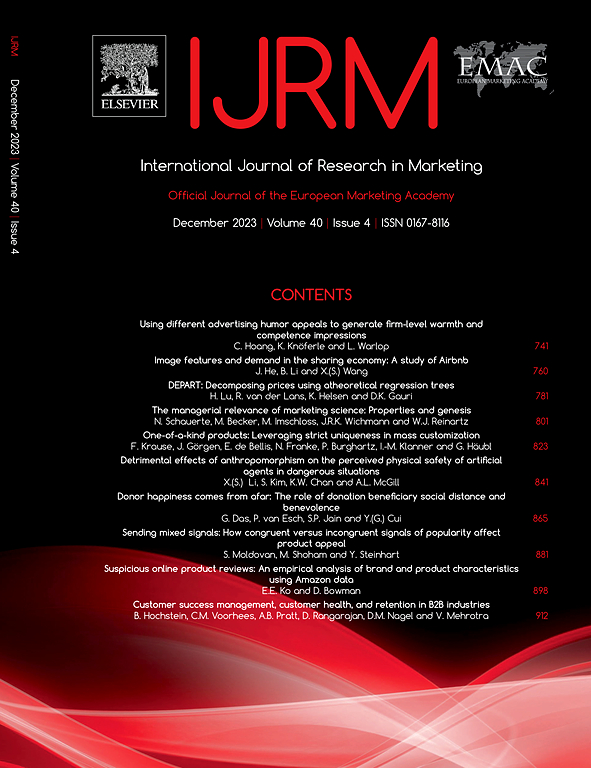The effectiveness of advertising and price during conflict delistings
IF 7.5
2区 管理学
Q1 BUSINESS
International Journal of Research in Marketing
Pub Date : 2025-09-01
DOI:10.1016/j.ijresmar.2024.12.001
引用次数: 0
Abstract
Negotiations between manufacturers and retailers often go sour and result in conflict delistings in which the manufacturers’ products are removed from the retailers’ assortment. While conflict delistings can cause major revenue and market share losses for both manufacturers and retailers, prior literature provides little guidance on how to use marketing actions to alleviate these severe damages. To fill this gap, the authors use a contingency framework to assess the impact of advertising and price for both manufacturers and retailers in different conflict delisting situations. Using household scanner data for different conflict delistings, this study reveals that overall the impact of advertising decreases during the conflict delisting for both involved parties while price reductions become more effective for the brand manufacturer (but not the retailer). Importantly, the impact of advertising and price during the conflict delisting depends on conflict characteristics. The impact of advertising will be higher if the firm initiated the conflict and when the conflict is surrounded by a lot of publicity. Price reductions are particularly interesting for retailers, especially when the conflict involved a smaller elimination size, when the retailer was the initiator of the conflict, and when there was less publicity. Price reductions are also fruitful for brand manufacturers in case they did not initiate the conflict.
在冲突退市期间广告和价格的有效性
制造商和零售商之间的谈判经常出现问题,导致制造商的产品从零售商的分类中移除。虽然冲突下架会给制造商和零售商造成重大的收入和市场份额损失,但之前的文献对如何利用营销行动来减轻这些严重损害提供的指导很少。为了填补这一空白,作者使用了一个权变框架来评估广告和价格对制造商和零售商在不同冲突退市情况下的影响。本研究使用家庭扫描仪数据对不同的冲突退市进行分析,结果表明,在冲突退市期间,广告的总体影响对双方都有所减少,而降价对品牌制造商(而不是零售商)变得更有效。重要的是,广告和价格在冲突退市期间的影响取决于冲突特征。如果冲突是由公司发起的,并且冲突周围有大量的宣传,广告的影响将会更高。降价对零售商来说特别有趣,特别是当冲突涉及较小的消除规模,当零售商是冲突的发起者,当宣传较少时。对于品牌制造商来说,如果他们没有引发冲突,降价也是富有成效的。
本文章由计算机程序翻译,如有差异,请以英文原文为准。
求助全文
约1分钟内获得全文
求助全文
来源期刊
CiteScore
11.80
自引率
4.30%
发文量
77
审稿时长
66 days
期刊介绍:
The International Journal of Research in Marketing is an international, double-blind peer-reviewed journal for marketing academics and practitioners. Building on a great tradition of global marketing scholarship, IJRM aims to contribute substantially to the field of marketing research by providing a high-quality medium for the dissemination of new marketing knowledge and methods. Among IJRM targeted audience are marketing scholars, practitioners (e.g., marketing research and consulting professionals) and other interested groups and individuals.

 求助内容:
求助内容: 应助结果提醒方式:
应助结果提醒方式:


